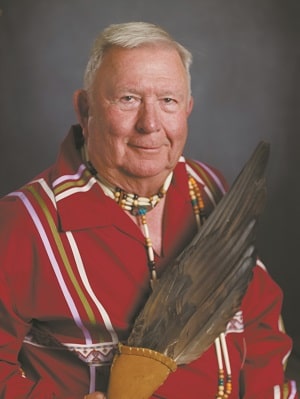 In Citizen Potawatomi Nation’s legislative District 4, which encompasses the State of Kansas, incumbent Jon Boursaw will face off against challenger Theresa Adame. This will be the third time that Boursaw and Adame meet in a legislative race. Adame won a narrow election in 2009 by 14 votes, while Boursaw won by an even narrower margin of three votes in 2013.
In Citizen Potawatomi Nation’s legislative District 4, which encompasses the State of Kansas, incumbent Jon Boursaw will face off against challenger Theresa Adame. This will be the third time that Boursaw and Adame meet in a legislative race. Adame won a narrow election in 2009 by 14 votes, while Boursaw won by an even narrower margin of three votes in 2013.
Born in Topeka, Boursaw was raised with a limited knowledge of his Potawatomi heritage; his great grandparents were each from one of the tribe’s founding families, Ogee and Bourassa. However, his family didn’t participate in what some might call “traditional” tribal practices despite their close proximity to the Prairie Band Potawatomi, a distinct tribal nation with close cultural and historical ties to the Citizen Potawatomi.
“We knew very little…we knew we were enrolled but my grandfather never mentioned anything about traditions or things like that. It was never carried over to his family.”
He recalled a sibling of his grandfather who refused to acknowledge the existence of their tribal heritage at all, likely stemming from norms of the times when government authorities regularly seized Indian children from their homes and when discrimination of Native Americans remained widespread.
“You weren’t held in high esteem, let’s put it that way,” noted Boursaw.
His knowledge and familiarity with his Citizen Potawatomi heritage in cultural and historical terms didn’t truly begin until his return to Kansas after a career in the U.S. Air Force and time in the private sector based out of Washington D.C.
“I was gone from Topeka for 38 years, with three of that 38 being an ROTC instructor at Kansas State University,” recalled Boursaw. “When I was in college I worked at the First National Bank of Topeka with the understanding that after I did my three years in the Air Force I would come back and there would be a position at the bank. Well I came back 38 years later and the bank had moved and changed names four times.”
His time in the service, like many career military members who served during the Cold War, took him around the world. Despite his initial plan on returning to Kansas, career advancement opportunities continued to arise and as he described it, “you’re eight or nine years in and you figure ‘what the heck, I’ll stay.’”
Rising to the rank of colonel, Boursaw eventually oversaw the management of operations on U.S. Air Force installations across the globe. Following his retirement from the service, he entered the corporate world, serving as an assistant vice president for Aetna Government Health Plans in southern California. Eventually, he and his wife, Peg, returned to Topeka. Within a few weeks he saw a position open with the Prairie Band Potawatomi, where he served as executive director for more than six years.
“There was a little ad in the Topeka paper and it said ‘Native American preference’ so I sent them my resume. Within two weeks of sending them my resume I was working for them.”
In Boursaw’s description, by the end of his tenure there he was responsible for overseeing approximately 32 tribal programs and departments, including a fire department, police and human resources. He said it closely resembled his time as an Air Force base commander.
Just when he thought he was finally ready to retire, after stepping down as the Prairie Band Potawatomi executive director, Boursaw attended a Rossville-area meeting of the Citizen Potawatomi Nation. CPN Tribal Chairman John “Rocky” Barrett told the former Air Force officer he needed someone to oversee the opening of the CPN Cultural Heritage Center and that his talents were being wasted in retirement.
Along with Peggy, Boursaw packed up again, this time for a stint as the CPN Cultural Heritage Center director, where he said he really began to understand the history and culture of the tribe. During this time Boursaw began to shape what has become a staple of gatherings across Kansas in recent years; his presentations on the history of the Citizen Potawatomi Nation’s time in Kansas.
With 32,000 tribal members spread across the U.S., it’s important for presentations like Boursaw’s to show those who live outside of the tribe’s jurisdiction in Oklahoma their connections to CPN history.
After winning a narrow election in 2013 against then-incumbent Theresa Adame, Boursaw continued with his presentations to groups throughout the Sunflower State. The emphasis on highlighting that history is part of his appeal to voters. Boursaw noted the accomplishments in office including securing the proper spelling of Bourbonnais Creek Bridge in November 2014 and recognition by Kansas Governor Sam Brownback of the state’s mistreatment of the Potawatomi during the 1800s at a ceremony in 2013 commemorating the 175th anniversary of the Trail of Death.
Should he succeed in his reelection bid, he said he’d focus on finding ways of bringing cultural teachings for tribal youth from ages 10 and older that are outside of the CPN jurisdiction in Oklahoma. Elaborating on an idea proposed by members of the 2017 Potawatomi Leadership Program, the Kansas legislator would like to hold a two day summit that instructs the youth on cultural history and practices, including dancing and other activities.
“The kids outside of Shawnee know very little about their culture and traditions and we’ve got dozens of them within an hour’s drive from Rossville,” said Boursaw.
